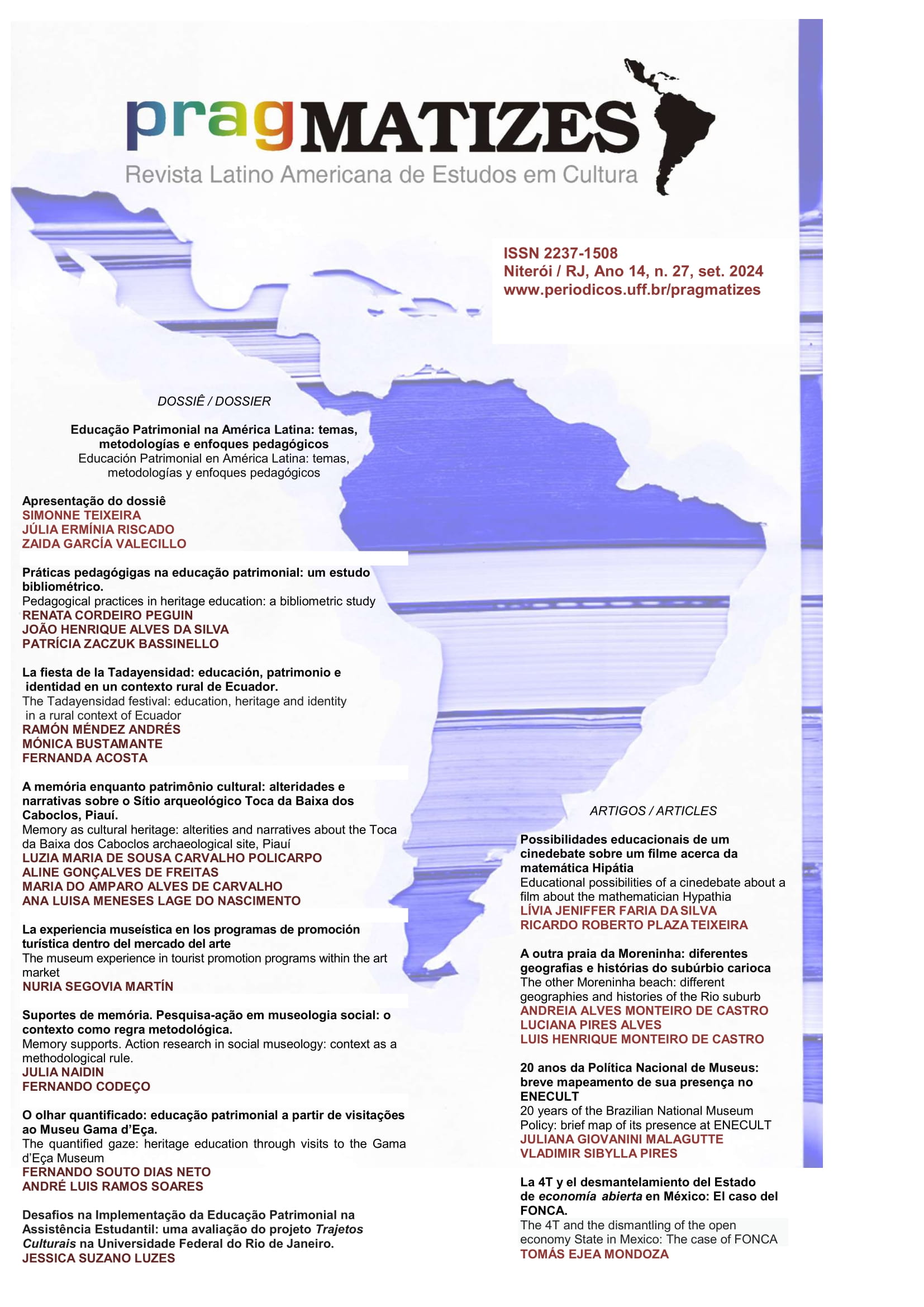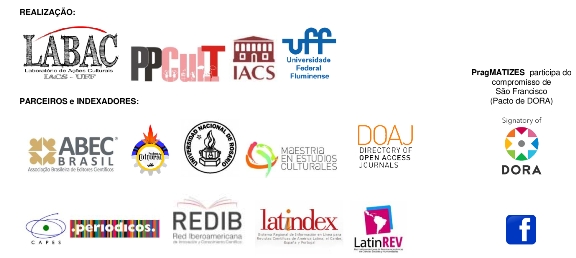Challenges in Implementing Heritage Education in Student Assistance
an evaluation of the project Cultural Routes at the Federal University of Rio de Janeiro
DOI:
https://doi.org/10.22409/pragmatizes.v14i27.62825Keywords:
Cultural management, Cultural production, Ex-post evaluation, Ex-ante evaluation, Data Science AnalyticsAbstract
How do universities contribute to heritage education in a country? They are social institutions that train professionals in the areas of history, conservation, restoration, among others, but in addition to the commitment to the specificities of these varied areas of knowledge, the aim is to focus on the student's integral development. This focus is based on the broad debate on the inclusion of culture and its diversity as one of the objectives of sustainable development (SDG), a challenge that crosses different areas of public policies, as evidenced in target 4.7, which associates inclusive and equitable education for quality of access to cultural goods. In this context, the "Cultural Paths" project arises, carried out by the Dean of Student Policies (PR7) of the Federal University of Rio de Janeiro (UFRJ). This project offers guided visits to cultural spaces for undergraduate and postgraduate students, many of whom are in situations of socioeconomic vulnerability. The focus is on the historical analysis of this project, carried out between 2018 and 2023, coordinated by the multidisciplinary team of the Sports, Culture and Leisure Division (DECULT) PR7/UFRJ. It starts with an ex-ante analysis that considers the context of policies in the field of student assistance, the development of an experimental project in the field of culture, the "Cultural Bus". The ex-post analysis is presented in results and discussions, which enable concrete results and impacts, having as a reference the guidelines of heritage education in Brazil, according to ordinance no. 137, of April 28, 2016. Both forms of evaluation (prior and later) involve an exploratory analysis of qualitative variables recorded in the participants' registration forms, all analyzed using Data Science Analytics techniques. As final considerations, feedback from participants in these actions is highlighted.
Downloads
References
BARROS, J. M.; OLIVEIRA JUNIOR, J. Pensar e Agir com a cultura: desafios da gestão cultural. Belo Horizonte: Observatório da Diversidade Cultural, 2011.
BASTOS, J. F.; CORRADI, R. A. Apostila de Gestão Financeira de projetos culturais. Pós-graduação em Gestão Cultural, Senac EAD, São Paulo, 2017.
BOURDIEU, P.; DARBEL, A. O amor pela arte. Os museus de arte na Europa e seu público. São Paulo: EDUSP ; Ed. Zouk, 2003.
CHAUI, M. A universidade pública sob nova perspectiva. Rev. Bras. Educ., n.24, p.5-15, 2003.
CHUVA, Márcia R. R. Os arquitetos da memória: sociogênese das práticas de preservação do patrimônio cultural no Brasil (anos 1930-1940). Rio de Janeiro: Ed. da UFRJ, 2009.
COSTA, S. G. A equidade na Educação Superior: uma análise das Políticas de Assistência Estudantil. Dissertação (Mestrado em Sociologia) - Universidade Federal do Rio Grande do Sul, Porto Alegre, 2010.
DELLAGNELO, E. H. L. Apostila do curso de extensão em Administração Pública da Cultura. Módulo 6. Planejamento na cultura. Porto Alegre: Ministério da Cultura/UFRGS/EA, 2015.
FILATRO, Andrea. Data Science na Educação: presencial, a distância e corporativa. São Paulo: Saraiva, 2020.
FONSECA, Maria Cecília Londres. A invenção do patrimônio e a memória nacional.. In: BOMENY, Helena. (org.). Constelação Capanema: intelectuais e políticas. Rio de Janeiro: FGV/EDUSF, 2001.
FONSECA, Maria Cecília Londres. O patrimônio em processo: trajetória da política federal de preservação no Brasil. Rio de Janeiro: Editora UFRJ; MINC- IPHAN, 2005.
LUZES, J. S. Para além de Perda e Cal: as reformulações do conceito de patrimônio cultural a partir dos debates do Conselho Federal de Cultura (1966-1968). In: VI Seminário internacional de políticas culturais. Rio de Janeiro: Fundação Casa de Rui Barbosa, 2015.
LUZES, J. S. A política e produção cultural no âmbito da assistência estudantil. In: IX Seminário internacional de políticas culturais. Rio de Janeiro: Fundação Casa de Rui Barbosa, 2018.
LUZES, J. S. Equidade social e os direitos culturais: desafios da política de assistência estudantil em universidades públicas. In: VIII Seminário internacional de políticas culturais. Rio de Janeiro: Fundação Casa de Rui Barbosa, 2017.
PAGNUSSAT, José Luiz. Avaliação Ex-Post de Políticas Públicas. Brasília, DF: Escola Nacional de Administração Pública (ENAP), 2021.
RUBIM, Antonio Albino Canelas. Desafios e dilemas da institucionalidade cultural no Brasil. Matrizes, v. 11, p. 57-77, 2017.
SILVEIRA, Miriam Moreira da. A Assistência estudantil no ensino superior: uma análise sobre as políticas de permanência das universidades federais brasileiras. Dissertação (Mestrado em Ciências Jurídicas, Econômicas e Sociais) - Universidade Católica de Pelotas, Pelotas, Rio Grande do Sul, 2012.
SUPEREST. Relatório das ações da Superintendência de assuntos estudantis (SUPEREST). Rio de Janeiro: SUPEREST, 2018. Disponível em: http://superest.ufrj.br/index.php/2017-04-28-17-36-23/relatorio2012 . Acesso em: 10 set. 2016.
UNIVERSIDADE FEDERAL DO RIO DE JANEIRO. Revista Você faz Cultura. Política Cultural, Artística e de Difusão Científico-Cultural da UFRJ, 2012. Disponível em: http://www.forum.ufrj.br/images/_forumcc/pdf_e_odt/revista_voce_faz_cultura_final_web.pdf .
Published
How to Cite
Issue
Section
License

This work is licensed under a Creative Commons Attribution 4.0 International License.
By forwarding an original to PragMATIZES, the authors agree that the copyright related to it is transferred to the Publishing. Articles and other writings are made available in PDF format from their publication, and they can be downloaded to institutional repositories and personal pages, provided that with their proper bibliographic indication.



